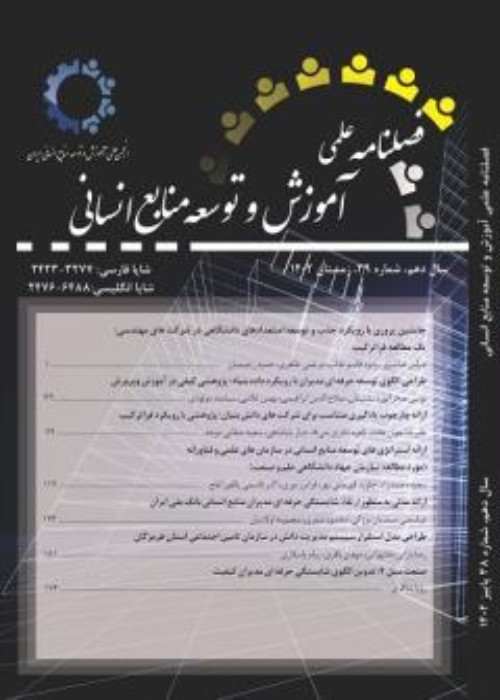Designing an Operating Training Model: A Study Based on Grounded Theory
Author(s):
Abstract:
This study aims to present an executive model for effective training of employees and managers in the Customs. To this end, the researcher developed an operating model for effective training in the Customs through conducting extensive interviews with the staff, managers and directors and the participants in the training courses and reviewing theoretical foundations and experience in training at the Customs and World Customs Organization. An analysis of the data in three steps of open coding, axial coding and selective coding suggests that the personnel are involved based on organizational factors such as the nature of organizational task, social responsibility of the organization, and organizational dynamics; job factors including task sensitivity, task specialty level, and task fluidity; personal factors such as internal and external motivation in training and professional development. Their involvement in learning through thorough preparation, motivation for transfer, individual capacity for transfer, and effective performance. How to allocate budget, management support, management restrictions, meritocracy, and educational rules and manner of executing rules and laws provide a special ground for training strategies. Moreover, structural strategies including matching the structure with the process of training, creating an training complex, developing human capacity, needs assessment strategies; design strategies including content suitability, motivational mechanisms, instructional calendar, and transfer design; execution strategies including education timing, interpersonal methods, international and online training; and assessment strategies including testing, exercise, attitude analysis, assignments, and effective performance are affected by the organizational factors such as organizational position, structural factors and personnel issues. Research findings indicate that effective strategies for training in the Customs are in positive and constructive interaction with fundamental and environmental factors and will lead to positive effects and consequences such as improved quality of service, increased financial interests and ultimately, formation of a learning customs.
Keywords:
Language:
Persian
Published:
Iranian Society for Training and Development, Volume:3 Issue: 9, 2016
Page:
137
magiran.com/p1585656
دانلود و مطالعه متن این مقاله با یکی از روشهای زیر امکان پذیر است:
اشتراک شخصی
با عضویت و پرداخت آنلاین حق اشتراک یکساله به مبلغ 1,390,000ريال میتوانید 70 عنوان مطلب دانلود کنید!
اشتراک سازمانی
به کتابخانه دانشگاه یا محل کار خود پیشنهاد کنید تا اشتراک سازمانی این پایگاه را برای دسترسی نامحدود همه کاربران به متن مطالب تهیه نمایند!
توجه!
- حق عضویت دریافتی صرف حمایت از نشریات عضو و نگهداری، تکمیل و توسعه مگیران میشود.
- پرداخت حق اشتراک و دانلود مقالات اجازه بازنشر آن در سایر رسانههای چاپی و دیجیتال را به کاربر نمیدهد.
In order to view content subscription is required
Personal subscription
Subscribe magiran.com for 70 € euros via PayPal and download 70 articles during a year.
Organization subscription
Please contact us to subscribe your university or library for unlimited access!



